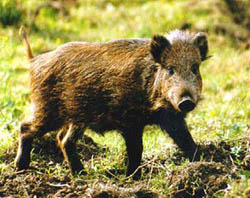| Home / Environment / Public Endeavor | Tools: Save | Print | E-mail | Most Read |
| Wild Animals Go on the Rampage |
| Adjust font size: |
Hao Xiuxi's father was gored by a wild boar one year ago, but the bloody scene continues to haunt her even today. He was torn apart. The injuries were so deep that I could actually see his heart," Hao, a farmer from the Taihu County of east China's Anhui Province, was quoted as saying by the Beijing News. The province is teeming with the ferocious creatures. It is estimated that the boar population has grown to 18,000 over the past three years. "Boars are everywhere," she said. "They look like moving black clouds from a distance."
Without any predators to keep their populations in check, some species have spread fast, causing major damages to property and, in some cases, injuring and even killing people. A boar, for example, gives birth to six or seven babies at a time. One of the consequences is that the number of confrontations between boars and humans has increased in recent years. Reports of injuries and damaged farmlands have become more frequent. For example, in southwest China's Yunnan Province, wildlife caused damage worth some 50 million yuan ($6.2 million) last year, Chen Zhengcai, deputy director of the provincial Forestry Department, was quoted by the Xinhua News Agency as saying. In the province's Nujiang Lisu Autonomous Prefecture about 85 cattle have been killed by wild tigers in the past three years. In Xishuangbanna Dai Autonomous Prefecture, wild animals have killed more than 20 people. Wild elephants destroyed the property of some 12,000 households in 2005, causing a damage of about 21 million yuan (US$2.6 million). Wild animals have caused problems in Taihu County as well boars damaged about a third of its farmland. "They eat up seeds and roots. Their noses are like digging machines that destroy everything," Hao said. "Planting crops is a waste of time and effort. It only takes boars one night to ruin one year of farming." Locals have tried a variety of measures to resolve the crisis. They used fireworks to scare off the boars, but that worked for only a month or two. The boars soon grew accustomed to the sound of the blasts. People installed electric fences, but local officials banned them after several people were injured by them. Villagers have used homemade guns to shoot the boars, but have police confiscated them. After all else failed, the village decided it was time to go on a hunt. For the first time in the county's history, local officials set up a hunting team on December 1. The six hunters and their dogs were hired from Zhejiang Province under a one-month contract. By the end of December, the team had killed nine boars, according to Jiang Jihua, the team's director. "The hunters were hired because we couldn't bear this any more," Zha Aiwu, director of Taiwu County's Forestry Department was quoted by the Beijing News as saying. "Having them here soothes the residents." Hao seemed to agree. "The fact that the local government hired hunters makes us feel safe. At least there is someone dealing with the issues here," she said. However, despite the team's popularity, it does face one serious hurdle it is technically illegal. "It is a huge pressure to hunt for boars," Zha said. "But the voice of the public made us resort to the gun. The point is that if we don't kill them, sooner or later the boars will eat up all the crop in our villages." Hunting permits are issued only when the wildlife population surpasses the capacity of the local environment, experts said. "Hunting can proceed after scientific research makes clear what areas need it and how many animals can be killed," Chen Wei, a professor at the Life and Science Department of the Beijing Normal University, told the Beijing News. "Without a thorough study, hunting could become poaching," Chen said. "Equally vital is to prevent hunting from becoming a sport." Such concerns are not without basis. Many private hunters have been lured to Taihu County by the region's profitable hunting prospects. "Hunters from the region and other places, equipped with highly advanced weapons and vehicles, camp in the forest for two or three days at a time," said a local veteran hunter surnamed Wu. These hunters can sell boars to local restaurants for 2,500 yuan (US$312) each. And local villagers welcome private hunters. "We support hunters, no matter where they come from," a local villager said. "As long as they kill boars." The hunts, whether carried out by local governments or by private hunters, are one of the few moves available to local authorities, since there is little they can do to compensate villagers who have had run-ins with wild animals. According to the 1998 Wildlife Protection Law, local governments should compensate victims of attacks by rare animals. But many local governments, particularly those in remote, poverty-stricken regions, do not have the money to pay. (China Daily January 10, 2007)
|
| Tools: Save | Print | E-mail | Most Read |
 |
| Related Stories |
